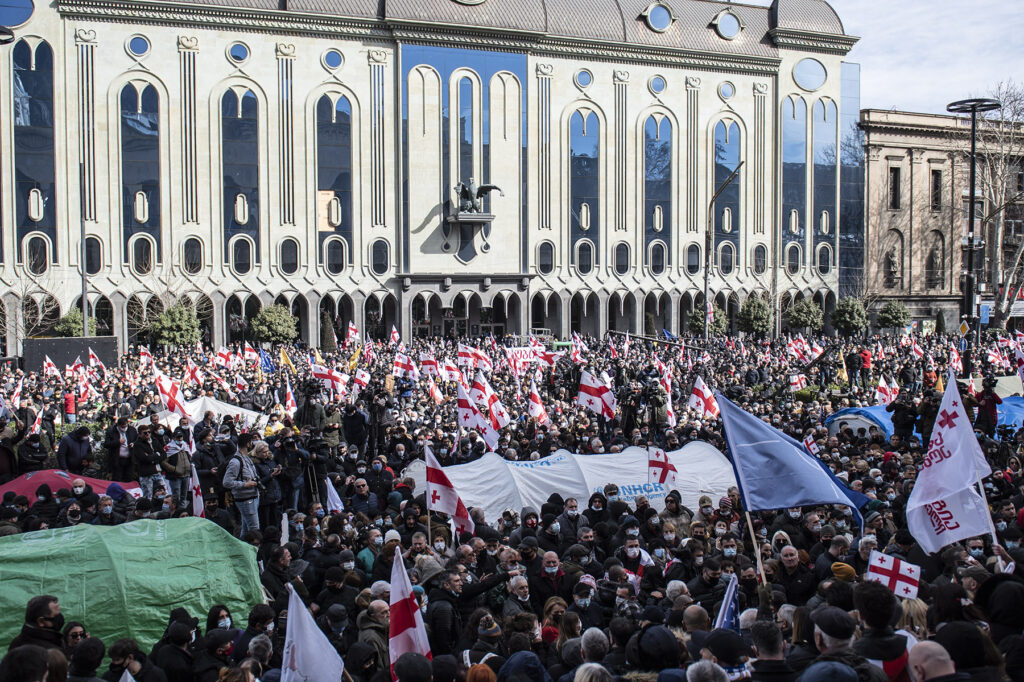Thousands have marched through central Tbilisi calling for the release of opposition leader Nika Melia and for snap elections to be called.
Friday’s demonstration was formally organised by a loose coalition of six major opposition parties, the United National Movement (UNM), European Georgia, Lelo, Strategy Aghmashenebeli, Labour Party, and Girchi for More Freedom. All six gained seats in October’s parliamentary vote but have boycotted parliament ever since over the conduct of the election and the vote count.
The united opposition front does not include the opposition Alliance of Patriots or Citizens groups, who also gained seats in the legislature.
The recent wave of protests in Georgia were sparked by the arrest of UNM leader Nika Melia in a raid on the party’s headquarters on Tuesday. The arrest was widely condemned at home and abroad.



[Read more: Protests and Western condemnation after Georgia opposition raid]
During Friday’s demonstration, UNM member Khatia Dekanoidze read out a letter from Nika Melia from his cell.
‘We have power, we have the will, we have a goal and the motivation to peacefully overcome radicalisation and the process of polarisation in the country… Today I don’t have an answer for Sandro [his son] for why I had not returned home. Maybe I won’t be able to explain it to him […] but tomorrow he’ll understand it — that I fight from here for tomorrow and with faith, for a better future’.
Opposition leaders also announced plans for multiple protests in upcoming weeks, including ‘pickets’ of parliament on 2 March and the Government offices on 5 March.

They also plan to hold the rally outside the Interior Ministry on 9 March and Tbilisi City Court on 11 March, followed by another demonstration outside Parliament on 13 March.
Despite some COVID-19 restrictions, including a 21:00 curfew still being in place, many protesters traveled from the regions to take part in the demonstration.
Several who came from Samegrelo, Adjara, and other regions, set up tents outside the parliament on 23 February, hours after UNM chair Nika Melia was apprehended by police.

An escalating crisis
The crisis that has been ongoing in Georgia since October’s parliamentary elections was regnited on Tuesday by Melia’s arrest.
Melia was arrested after Tbilisi City Court approved a request by the Prosecutor’s Office to have him remanded into pre-trial detention. Melia, who was appointed UNM leader in December, had refused to pay an increased bail. He is facing charges for inciting violence during the June 2019 protests in Tbilisi.
Internal disagreements within Georgian Dream over weather or not to carry out the arrest culminated in the resignation of Prime Minister Giorgi Gakharia on 18 February.
He was replaced on Monday by Irakli Gharibashvili, who dedicated most of his confirmation hearing to criticising the UNM.
The raid on the UNM offices was one of Gharibashvili’s first moves as PM. While leaders of other opposition groups had previously vowed to defend Melia against the police, most were absent as police entered the party’s offices to detain him early on Tuesday morning.

The government has since been reprimanded by local civil society groups for escalating the situation, as well as for using chemical irritants against Melia’s supporters inside the building.
On 26 February, after the Georgian government faced a wave of condemnation from the country’s key strategic allies, including the US and the EU, the Prosecutor’s Office announced that they would appeal to the courts to release Melia if he agreed to pay his bail.
Melia was quick to reject the idea, insisting his prosecution was politically motivated.




 26 February 2021
26 February 2021



